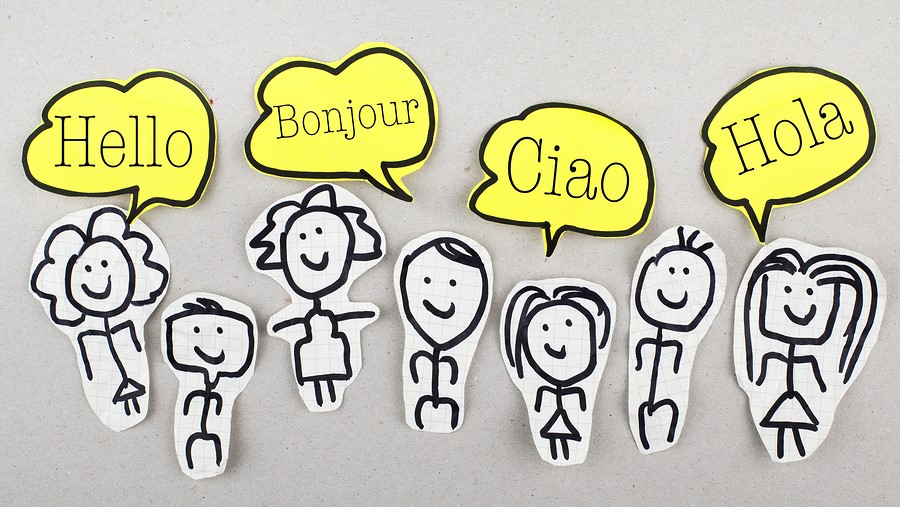
Whether you’re an avid traveller, you need a professional upper-hand or are just looking to take up a new hobby, learning (at least) one foreign language is undoubtedly an asset. However, many students are often put off the prospect, regardless of its obvious benefits, and the excuse most often cited is lack of time.
Of course, sitting down with a textbook for a couple of hours a week may have been the appropriate approach to learning a new language when you were at school, but the increasingly fast-pace of our lifestyles, as well as the necessity to be able to learn a language a lot quicker than before, can be construed as a problem.
But fear not! Below we’ve listed some of the more creative ways that have been proven to be the most effective language learning methods, for any kind of learner.
Listen to music
Although the majority of songs (even those performed by foreign bands) tend to be in English, you are bound to discover some fantastic ones in the language you are trying to learn. This method not only gives you the chance to expand your musical horizons, but it is a demonstrated method of absorbing a foreign language a lot quicker.
Exposure to oral displays of a language is the most common method language teachers suggest to their pupils in any age group, because it is an accessible means of having your brain adjust to the sounds and words. Spotify, for example, offers playlists of songs in French, Spanish or Italian, which are easy to play while you’re at the gym or during your daily commute.

Watch foreign films
A suggestion in the same vein as the one above, films are another easy way to gain exposure to a foreign language. If you are just at the beginning of your language-learning journey, it’s best to start off viewing a film you are acquainted with (an instalment of Harry Potter for instance) in the language of your choosing and with subtitles.
Knowing the plot, you will be able to focus on learning the words themselves. When you’ve graduated from this stage, you can watch new films with (and eventually without) subtitles and you will notice a significant improvement in your vocabulary.
If you are looking to gain more insight into the cultural and social aspects of the country, you may even turn to their own cinematic gems (Fellini’s films from the 1960s for Italian language-learners, Amélie for those learning French and Pedro Almodóvar’s works for Spanish enthusiasts).

Try using language-learning apps
Since we use an app for almost everything nowadays, why not use one in language learning? There are some outstanding mobile apps designed specifically for learning the key elements of a language in short increments of time and on the go. The one I’ve found most efficient is Duolingo, as it’s an ideal companion during a long commute, or, for a more academic approach, the flashcards-based app, Memrise.
Another means of immersing yourself in a new language using your phone is by changing the phone’s language to the one you’re learning. It always helps to be constantly introduced to it.

The Phrase-per-Day Method
Regardless of whether you are still keen on books or apps, a failsafe way of constantly improving your language-learning skills is by committing to studying one phrase a day in your chosen language. Since your mind needs to start making connections in that tongue, you need to accustom your thinking through the gradual introduction of phrases in your day to day life.

Travel and converse with native speakers
A quintessential part of learning a new language is practice and who better to use as a partner than a native. The international profile of most universities permits you to discover at least one native/fluent speaker of the language you are interested in. Then why not make the most of it while you grab a cup of coffee with them next time you’re on campus.
An alternative is, of course, travelling. If you’ve got itchy feet and a sense of adventure, why not take some time abroad and briefly immerse yourself in the language and culture. Sit in a cafe and listen to conversations, go into shops and make yourself not use English as a crutch. The effects are visible and your time spent there will always be remembered fondly.

Get a Pen-Pal or go on a date
If perhaps the language you are learning is quite niche, it may be the case to cast a wider net in order to find a practice partner. Albeit a bit old-fashioned, a pen-pal is a certain way of making sure you don’t lose contact with the language you are learning. In the modern age, places like Facebook, Instagram and Twitter are the most likely places where you could chat with somebody in a language different to your own.
In the same way (and provided you are feeling particularly brave) you can even set your dating apps to an area where you would get the chance to interact on a more personal level with someone who is speaking a foreign language.

Call a Swede
A very ingenious way the Swedes have devised to improve tourism can also be a cracking way for you to improve a foreign language. According to Call Sweden, this Norse country has its own phone number which, if called, will put you in contact with a random Swedish person.
Thanks to the friendly nature of Swedes, they would be more than happy to chat with you over the phone. Their English is very good, so if you are a foreign student looking to improve your spoken English or you happen to have taken up Swedish, just give them a ring.

Speak to Yourself
In keeping with the idea of practice, while you’re saving up money for that trip abroad, why not talk to yourself in the meantime. Most of us find ourselves doing it anyway when we’re around the house, so make the most of your chatty nature. Whether you’ve got enough linguistic baggage to have entire monologues or you are just naming the food in your fridge, it is still highly valuable practice!

Cook a recipe in a foreign language
Speaking of food, a language can also be learnt while you’re building up an appetite. In fact, foreign cuisine may contribute to your learning ambitions. Following a recipe (no matter how simple) in a foreign language can be a key way of practising your vocabulary and your understanding. As they are often in list form, they provide a straight-forward learning aid.
.jpg)
All in all, regardless of which method you choose, make sure you stick to it and are committed to continuously improving your craft. Good luck!
Be sure to follow us on Facebook for more useful hints, tips and updates.